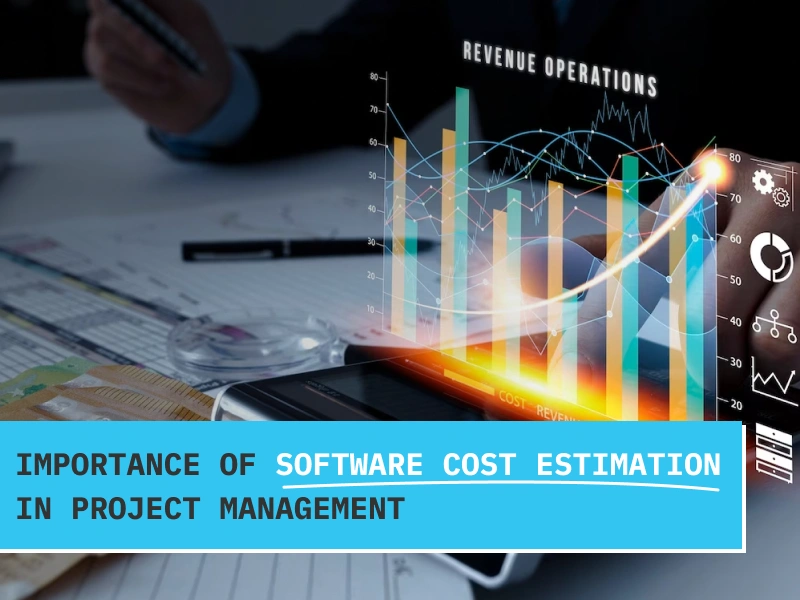Quick Summary
In software development, cost estimation is a key part of managing projects. It helps ensure projects stay within budget, are completed on time, and meet quality standards. By accurately estimating costs, businesses can make better decisions, use resources wisely, and avoid unexpected financial problems.
Introduction
Software cost estimation is one of the most critical steps in project management, particularly in the tech industry. Without accurate cost estimation, projects may go over budget, miss deadlines, or fail to meet quality standards. Effective cost estimation allows project managers to assess the financial feasibility of a project, allocate resources efficiently, and avoid financial pitfalls. Tools like a software development cost calculator can assist in accurately predicting expenses related to the development, deployment, and maintenance of software, including labor, materials, tools, and other associated costs.
What is Software Cost Estimation?
Software cost estimation refers to the process of predicting the amount of time, money, and resources required to complete a software development project. It encompasses various techniques and tools that help project managers predict the cost of building a software product or system based on scope, complexity, timeline, and resource availability.
There are multiple methods used for cost estimation in software projects, including expert judgment, historical data analysis, analogy-based estimation, parametric estimation, and algorithmic models. These methods consider both the direct and indirect costs, such as:
- Development Costs: Salaries of developers, designers, and other staff.
- Operational Costs: Server, infrastructure, and maintenance costs.
- Quality Assurance: Cost of testing, bug fixing, and compliance.
- Contingency: Budget reserved for unforeseen expenses.
The Role of Software Cost Estimation in Project Management
Software cost estimation plays a fundamental role in project management by:
1. Setting Realistic Expectations: Accurate cost estimates help manage expectations by providing a clear understanding of what can be achieved within the set budget.
2. Budgeting and Financial Planning: Proper cost estimation helps allocate funds to each phase of the project, ensuring that resources are available when needed.
3. Risk Management: Identifying potential financial risks early on allows teams to prepare contingency plans, reducing the likelihood of budget overruns.
4. Resource Allocation: Estimations help project managers assign the appropriate number of team members and tools, optimizing productivity and avoiding resource waste.
5. Tracking Progress: Cost estimation also aids in monitoring the project’s financial health, allowing managers to track spending and adjust accordingly.
Key Factors That Impact Software Cost Estimation
Several factors that influence software development cost affect the accuracy of software cost estimation.
1. Project Complexity: The more complex the project, the more difficult it becomes to estimate accurately. Complexity includes the number of features, integrations, and the level of customization required.
2. Experience of the Development Team: A skilled and experienced team is likely to provide more accurate estimates. In contrast, inexperience or lack of domain knowledge may lead to underestimations.
3. Technology Stack: The choice of technologies can significantly impact costs. Cutting-edge technologies or unproven solutions may have higher learning curves, affecting both time and budget.
4. Scope of the Project: A larger project scope with unclear requirements or frequent scope changes can lead to cost overruns. Defining a clear scope early in the project can help maintain estimates.
5. External Factors: External factors such as regulatory changes, market dynamics, and economic conditions can also influence software costs. These factors need to be considered during estimation to mitigate unforeseen financial risks.
Quick Read: How to calculate cost for an offshore software development team
Benefits of Accurate Software Cost Estimation
Accurate software cost estimation provides several benefits:
- Better Budgeting and Planning: When costs are estimated correctly, it helps the project team allocate funds for each task, reducing the risk of running out of money halfway through.
- Enhanced Decision-Making: With clear cost estimates, businesses can make more informed decisions on whether to proceed with a project, delay it, or cancel it based on its financial viability.
- Optimized Resource Utilization: Accurate cost estimation ensures that the right number of resources are allocated to each part of the project, maximizing productivity and minimizing waste.
- Improved Stakeholder Communication: Cost estimation helps communicate the financial aspects of the project to stakeholders, providing transparency and fostering trust.
- Risk Mitigation: By factoring in contingencies and potential risks, accurate cost estimation helps mitigate the impact of unforeseen issues, reducing the chance of cost overruns.
- Increased Project Success Rate: Projects with well-established budgets and resources tend to be completed on time and within scope, ensuring successful delivery and client satisfaction.
Conclusion
Software cost estimation is an essential practice in software project management. It not only ensures that a project is financially feasible but also enables better decision-making, resource allocation, and risk management. By taking into account key factors that influence cost estimation and understanding its role in the overall project lifecycle, businesses can enhance the likelihood of success. The benefits of accurate software cost estimation—such as improved budgeting, stakeholder communication, and resource optimization—are invaluable in ensuring that projects are delivered within budget and on time.
FAQs
1. How can I improve my software cost estimation accuracy?
Ans: Improving accuracy involves gathering historical data, involving experienced professionals, clearly defining project scope, and adjusting estimates based on changes in requirements.
2. How often should software cost estimates be reviewed?
Ans: Cost estimates should be reviewed at each major project milestone or whenever significant changes occur in scope, resources, or technology.
3. Can cost estimation be done without historical data?
Ans: While historical data enhances accuracy, cost estimation can still be done using expert judgment and other estimation techniques, although it may be less precise.
4. Why is Cost Estimation Important in Project Management?
Ans: Cost estimation helps manage budgets, allocate resources, and avoid financial overruns, ensuring the project stays on track and meets its goals.
5. What is the Purpose of Software Project Estimation?
Ans: Software project estimation predicts the time, cost, and resources needed, enabling effective planning and ensuring the project is completed on time and within budget.











 30 mins free Consulting
30 mins free Consulting 
 7 min read
7 min read 







 Love we get from the world
Love we get from the world 